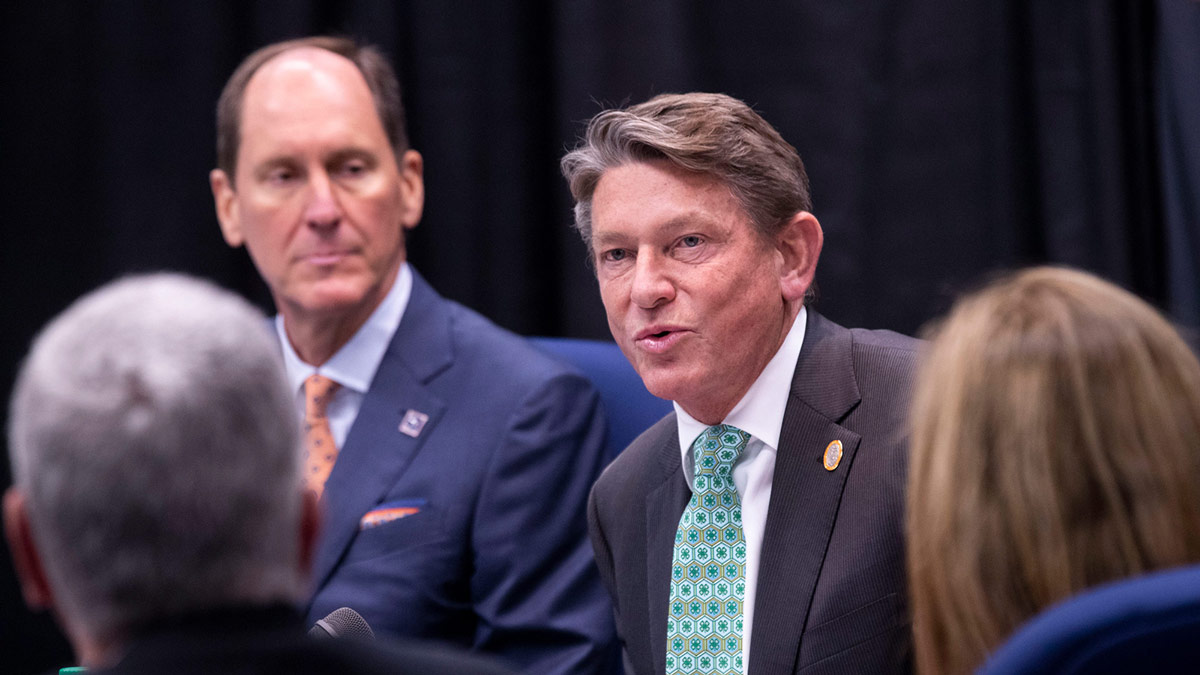
KNOXVILLE – For a record-setting fifth year in a row, the University of Tennessee System Board of Trustees voted to keep tuition increases low.
That decision marked the first time in System history that the undergraduate tuition increases were kept at 3 percent or lower for five consecutive years. The increases range from 2 percent for UT Knoxville to 2.5 percent for UT Chattanooga and UT Martin. The increases from Fiscal Year 2018-2019 to Fiscal Year 2019-2020 equal $258 for UT Knoxville, $216 for UT Chattanooga and $236 for UT Martin.
Keeping tuition low is part of the University’s efforts to make higher education affordable for all Tennesseans, UT Interim President Randy Boyd said.

“Land grant institutions were created to assist the working class and lower class to move up. We, at the University of Tennessee, are not about exclusion, but about inclusion. We are working to keep tuition low and with the creation of the UT Promise, which will start in 2020, to help families with yearly incomes of less than $50,000 to provide a ladder up to Tennesseans,” he said.
Trustees also approved unifying the UT Institute of Agriculture with UT Knoxville to increase collaboration between the two campuses and to raise the national rankings. In a presentation before the Education, Research and Service Committee, Vice President for Research Stacey Patterson noted that UT is the only university in the United States that reports its agricultural programs, including research, separately. By combining the two, the University would rise in national rankings.
With the approval, UTIA Chancellor Tim Cross’s title becomes senior vice chancellor and senior vice president for agriculture. He will report to incoming UT Knoxville Chancellor Donde Plowman and to Boyd. Boyd noted that previously UTIA and UT Knoxville reported research as a single unit, but that changed in 2010 with the change in title of the UTIA head from vice president to chancellor.
“Agriculture is critical to our state. In his role as senior vice president, he will serve as the third highest ranking member of the University of Tennessee system administration. He will make sure that the statewide agriculture voice is heard,” Boyd said of Cross.
Cross said it would be important to bring faculty, staff and stakeholders to help develop plans and ideas that will benefit UT Institute of Agriculture and UT Knoxville.
“We don’t want to lose what makes us special and unique, but we don’t want to stand in the way of progress,” Cross said.
Trustee Bill Rhodes commended Cross.
“It’s always remarkable when a person puts an organization above self,” Rhodes said.
Trustee Donnie Smith said it is important to recognize that UTIA has improved during the past 10 years and to make sure that the trustees listen to all of the stakeholders.
“We’re going to listen. We’re going to get input and that input’s going to matter,” he said.
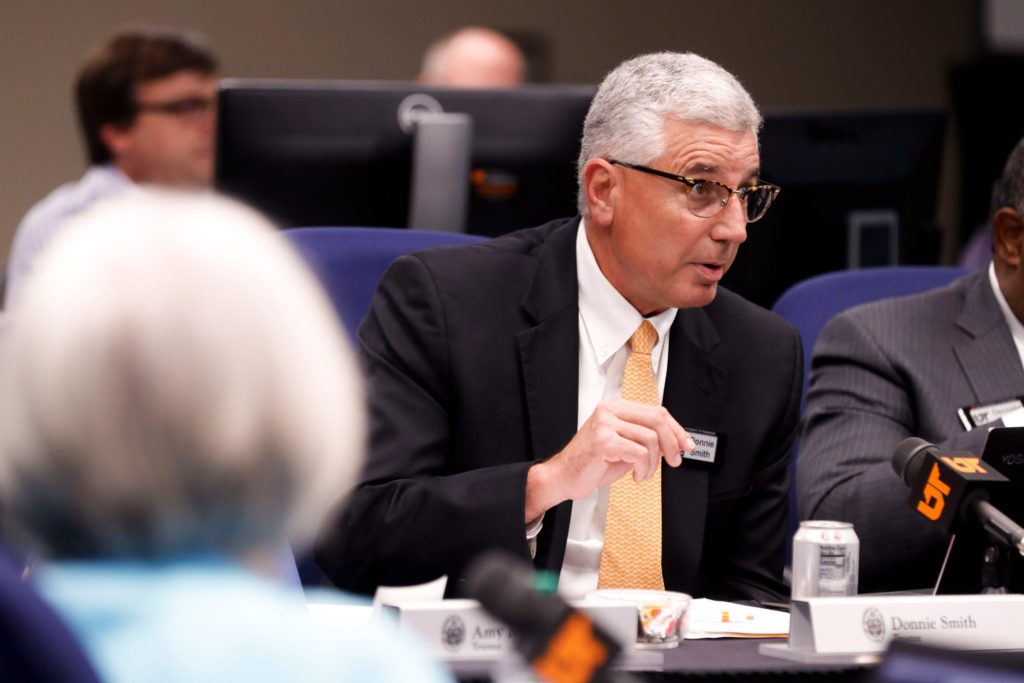
In the coming days and weeks, Boyd will seek additional input from faculty, staff and other stakeholders regarding the unification. He and officials with both campuses will continue to work on a detailed plan regarding the unification, which will be submitted to the trustees during their Nov. 8 meeting.
The unification would allow UT to truly serve all Tennesseans while elevating UTIA and UT Knoxville to become a leading and globally competitive research institution, Boyd said.
“For 50 years the UT Institute of Agriculture has been rooted in our communities in all of Tennessee’s 95 counties. It will continue to do so for the next 50 years and beyond,” Boyd said. “This unification will able us to leverage the best of UTIA and UT Knoxville to truly serve all Tennesseans.”
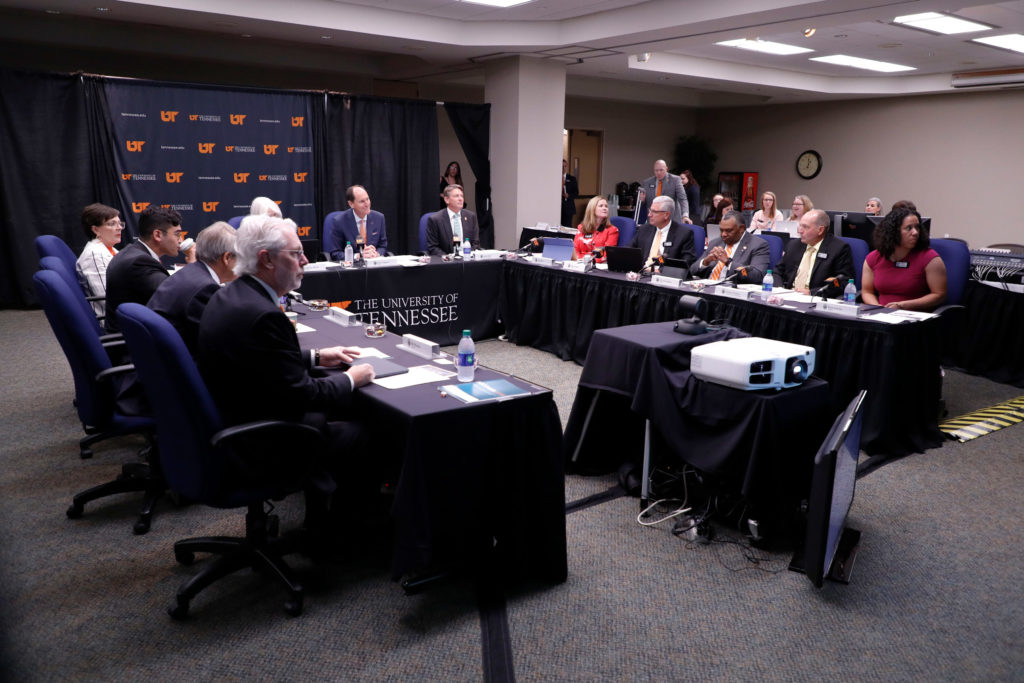
Trustees also approved a resolution creating the Oak Ridge Institute to foster a stronger, more coordinated relationship between the University and Oak Ridge National Laboratory. The Institute will move five joint UT and ORNL programs under a single administrative umbrella as both institutions seek to most effectively prepare the next generation of scientists and engineers for a global economy that demands interdisciplinary problem-solving, teamwork and innovation.
“The Oak Ridge Institute is making the most of the opportunity we have in front of us,” Patterson said.
Boyd pointed out that the new institute was co-created with ORNL.
“Our nation needs to develop the talent to lead the world,” he said.
ORNL Director Thomas Zacharia said students from a variety of universities come to ORNL for doctoral and post-doctoral work and that the new institute will ensure coordinated expansion of UT programs. Researchers with national lab experience go on to start companies, to do Nobel-winning research and to provide the leadership and expertise demanded by labs, universities and industries, he said.
“The most productive and profound research happens during the early part of the career,” Zacharia said. “The Institute will, in the fullness of time, provide 500 Ph.D. students who will challenge and enrich us.”
Those students would then continue to impact the world through new innovations and businesses, perhaps becoming Nobel Prize winners or staying at the lab or the University conducting research, Zacharia said.
Under the approved resolution, at the Nov. 8 Board meeting, Boyd will submit a detailed business plan for the Institute.
The Institute will strengthen a long-standing partnership, which has seen growth during the past 20 years with joint facilities, prominent research teams, a joint graduate program and interdisciplinary research initiatives.
UT Board Chair John Compton said in a career there are two to three decisions made that can be considered important.
“With the actions we’re taking today around research, I’m quite confident we’ll look back at this in six to 10 years as one of the most important decision we made,” he said.
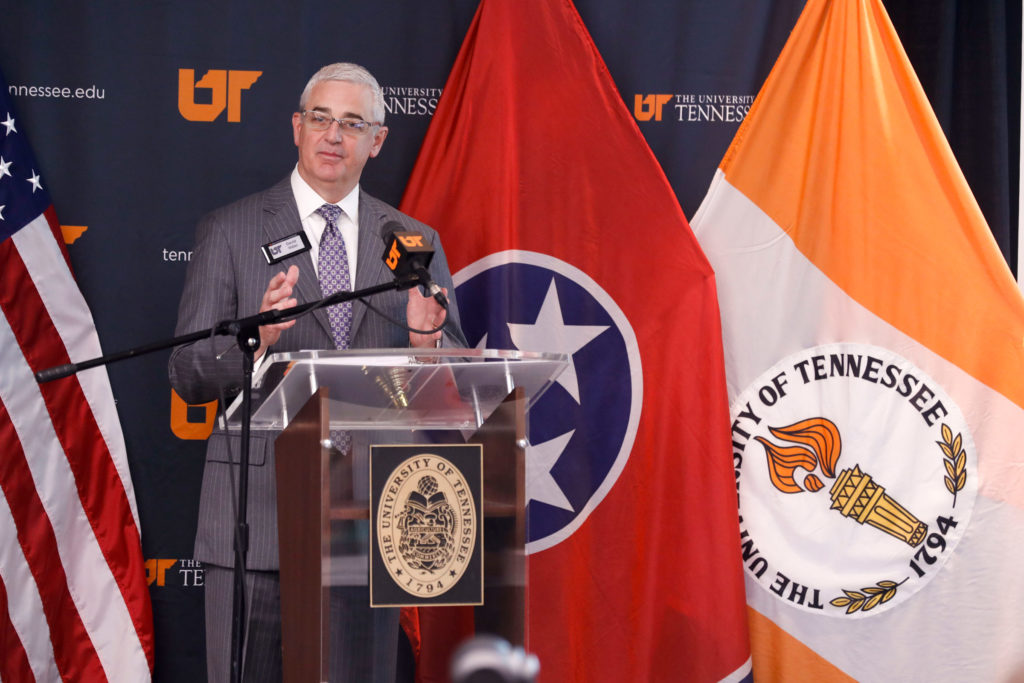
During the meeting, UT Chief Financial Officer David Miller reported on the Task force for Effective Administration and Management (TEAM) findings. The task force, along with Deloitte Consulting, sought to clarify the roles and responsibilities between System and campus staff in five non-academic areas: capital projects, communications and marketing, human resources, information technology, and procurement and contracting.
From identifying opportunities for improvement to best practices in higher education and other industries, the task force looked for ways to streamline processes and reduce costs. Miller noted that Deloitte officials said to bridge the gap between best practices and UT’s current state will take strong governance, metrics, trust, proof of concept and leadership.
“All UT campuses and institutes would benefit from standardizing operations as we prepare to move into the next generation of management technology,” Miller said. “It would save the University money and deliver services to students and faculty more effectively.”
After trustees endorsed the report, they charged Miller and the University administration to begin implementing solutions identified in the report. They requested that Miller report progress during upcoming Board meetings.
During Boyd’s remarks, he and UT Martin Chancellor Keith Carver announced a $22 million bequest from Bill and Rosann Nunnelly to UT Martin. The gift, the largest in UT Martin’s history, will provide scholarships to students. The scholarships will give preference to students from Hickman County, where Bill Nunnelly, a 1970 UT Martin graduate, was raised on a cattle and feed grain farm. While the gift will not be fully realized until after the couple’s deaths, the scholarships will begin immediately this fall for four Hickman County students. In the future, more than 90 scholarships could be awarded annually to qualified students from Hickman, Dickson, Giles, Lawrence, Lewis, Maury and Humphreys counties.
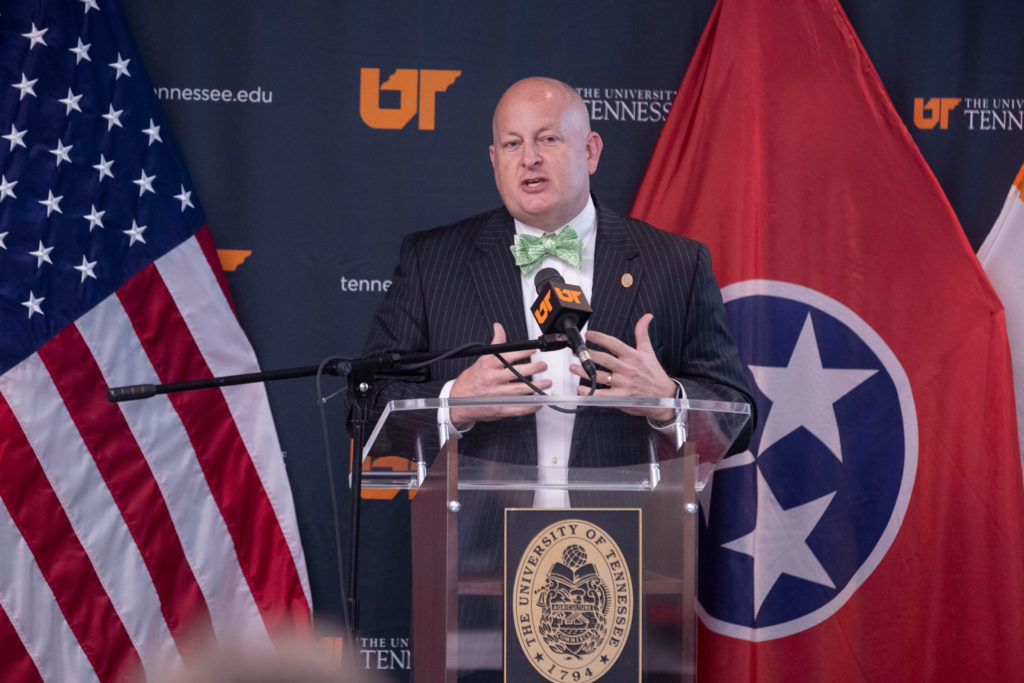
“We appreciate the Nunnelly family opening doors for students from rural counties to attend UT Martin,” Boyd said. “They are helping to change not only the lives of students, but also of families, communities and the state. The impact of their gift will reverberate through generations of Tennesseans.”
Trustees also approved authorizing the University to file a cy pres action in Knox County Chancery Court to sell the Eugenia Williams estate. After 20 years of exploring options to use the home located in Knoxville, this spring Boyd made the decision to seek approval to sell the property and use the proceeds to establish the UT Promise Dr. David Hitt Williams Endowment, in honor of Eugenia Williams’ father. UT Promise is a last-dollar scholarship program that will guarantee free tuition and fees for students with a family household income of under $50,000 after other financial aid is received. UT Promise will enroll its first class of students in the fall of 2020.
In other business, trustees approved:
- Strategic plan refresh, 2019-2025 with its foundation of championing diversity and inclusive excellence and its goals of enhancing educational excellence, expanding research capabilities, fostering outreach and engagement, ensuring workforce and administrative excellence, and advocating for UT.
- A total operating budget of almost $2.5 billion for Fiscal Year 2019-2020, which is 3.5 percent higher than the operating budget of Fiscal Year 2018-2019. The budget also includes faculty and staff salary increases for the coming year.
- $600 million in requested state funding for capital projects from Fiscal Year 2020-2021 through Fiscal Year 2024-2025, including for an audiology and speech pathology clinic for UT Health Science Center, a new nursing building for UT Knoxville and the Grove Multipurpose Center for UT Martin.
- $306.9 million in requested state funding for capital maintenance projects from Fiscal Year 2020-2021 through Fiscal Year 2024-2025.
- $76 million in revenue or institutionally-funded projects for Fiscal Year 2020-2021.
- Lowering the out-of-state tuition rate for UT Chattanooga students from South Carolina and any state that borders Tennessee beginning in Fiscal Year 2020-2021.
- Increasing differential tuition for the UTC College of Nursing
- Tenure recommendations.
- UT Chattanooga’s voluntary retirement incentive plan.
Archived video for the June 21 meetings can be found at trustees.tennessee.edu.
Contacts
Melissa Tindellmtindell@tennessee.edu
865-974-0741
Jennifer Sicking
jsicking@tennessee.edu
865-974-5179
